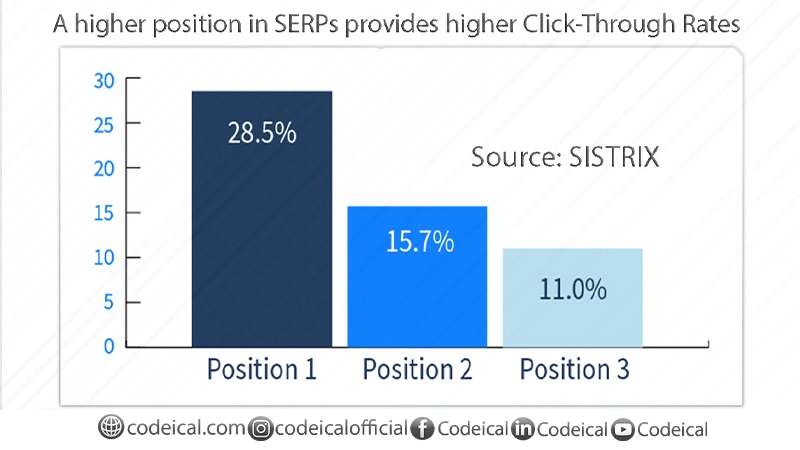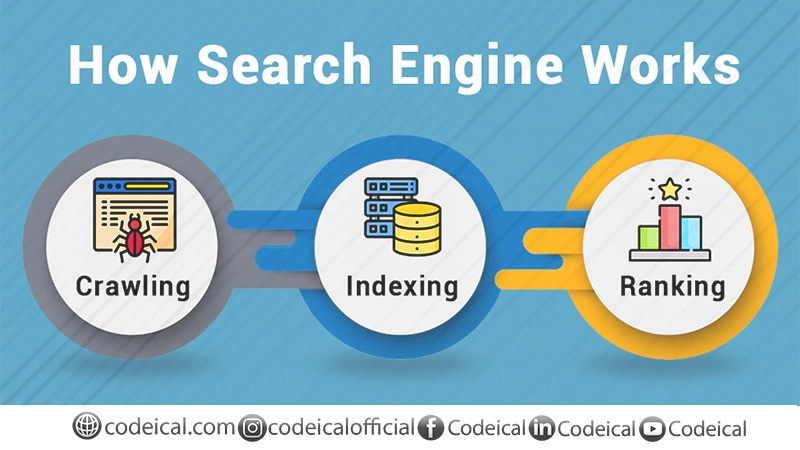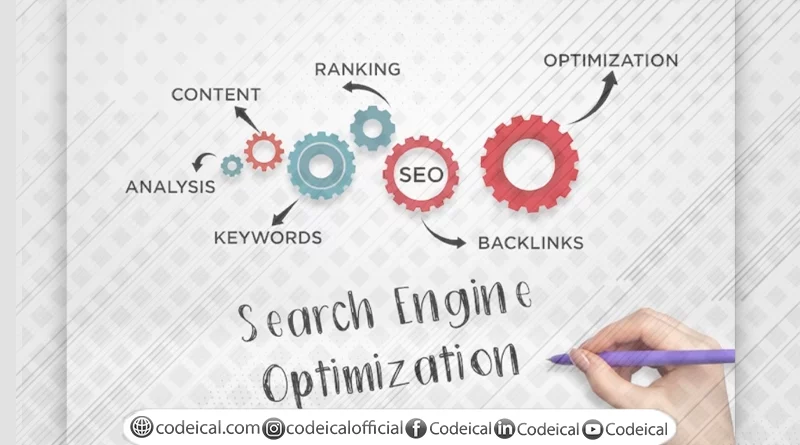What is SEO-Search Engine Optimization and 5 ways how you can grow your sales like never before
A Beginner’s Guide to SEO
Search Engine Optimization (SEO) plays a crucial role in achieving success online by generating organic traffic and improving online presence. In the current digital landscape, where competition is intense, having a robust SEO strategy is vital for small business owners, eCommerce store owners, website owners, bloggers, and webmasters alike.
The significance of SEO cannot be overstated. Consider this: when was the last time you searched for something online and went beyond the first page of search results? Most likely, you didn’t. Studies indicate that the majority of users heavily rely on search engines to discover information about websites, products, and services. If your website doesn’t appear among those top positions, you miss valuable opportunities to connect with your target audience.
Every day, people browse the internet and conduct searches. According to Global Web Index, 60% of the world’s population has internet access. Did you also know that more than half of B2B and B2C website traffic (53%) comes from organic search? This means that search engines like Google can be responsible for over half of your website’s traffic. Therefore, optimizing your website for search engines is essential to attract website traffic.
This article aims to educate and empower individuals in the aforementioned roles by providing a comprehensive guide to the fundamentals of SEO. Whether you are a beginner or looking to enhance your existing efforts, this guide will equip you with the knowledge and skills necessary to make a positive impact.
The article’s structure will cover key aspects of SEO, including on-page optimization, off-page optimization, and technical SEO. It will also explore the skills required to excel in SEO, such as content creation and optimization, keyword research and analysis, link building and outreach, as well as analytics and reporting.
By the end of this article, you will have a strong understanding of the importance of SEO, its influence on organic traffic and online visibility, and the skills needed to develop an effective SEO strategy.
SEO is not as complex as it may seem. Once you grasp the basics, you’ll realize that SEO involves implementing best practices that increase the chances of search engines and visitors finding your website.
That’s why we have created this beginner’s guide to help you kickstart your SEO and content marketing journey for your site. So, let’s dive in and unlock the power of SEO for your online success.
Understanding What is SEO?
Implementing an SEO strategy is crucial because a significant portion of search engine traffic comes from organic sources. This type of website traffic is highly desirable as it doesn’t require any monetary investment to attract visitors. Additionally, research indicates that approximately 75% of searchers exclusively click on results displayed on the first page of search engine results pages (SERPs). Consequently, if your website appears on the first page for a specific search query, you have the potential to receive the majority of clicks and traffic.
Moreover, even among the results on the first page, the closer your website is to the top, the more traffic it is likely to generate. According to SISTRIX, the leading search results exhibit a click-through rate (CTR) of 28.5%.

If your website isn’t ranking near the top, you won’t get as much traffic, leads, sales, and revenue.
How Search Engines Work
To grasp the basics of SEO, it is essential to comprehend the functioning of search engines to identify the specific areas of your website that require optimization.

Let’s consider Google as an example. Before Google can present its website to its users, it goes through three essential steps: crawling, indexing, and ranking.
• Crawling: Google dispatches robots, also known as spiders or crawlers, to explore hyperlinks on the web and discover new content. This content can include webpages, PDFs, images, videos, or anything that can be linked. When the crawlers reach a web page, they collect information about it and follow links to other pages. AftAfterwardhey reports their findings back to Google.
• Indexing: If the crawlers come across unique content, they include it in the vast database of identified URLs, referred to as the ‘search index.’
• Ranking: Once the URLs are in the database, the ranking process commences. For every search query, Google endeavors to arrange the results from most relevant to least relevant.
Therefore, for your website to appear on the first page of Google, it is crucial to provide relevant answers to what people are searching for.
Core Fundamentals of SEO
To achieve the best possible results in your SEO endeavors, it is crucial to comprehend the fundamental elements that contribute to a successful strategy. Let’s examine these components and their role in enhancing your website’s visibility and search rankings.
• On-Page Optimization: On-page optimization concentrates on optimizing elements within your website. Consider the following key areas:
- Keyword research and analysis: Researching and selecting relevant keywords that align with the search queries of your target audience.
- Optimization of meta tags: Crafting compelling titles, descriptions, and headings that accurately represent your content and incorporate the targeted keywords.
- URL structure and formatting: Creating clean and descriptive URLs that are easily understandable by both users and search engines.
- Content optimization: Developing high-quality, keyword-rich content that is engaging, readable, well-formatted, and provides value to your audience.
- Internal linking and site architecture: Creating a logical and user-friendly website structure, with well-structured internal links that improve navigation and distribute authority throughout your site.
- Image optimization: Optimizing images by reducing file sizes, using descriptive filenames, and adding relevant alt text to improve accessibility and search engine understanding.
• Off-Page Optimization: Off-page optimization focuses on external factors that impact your search engine rankings. Consider the following:
- Link building and earning backlinks: Obtaining top-notch backlinks from respected websites to showcase authority and credibility to search engines.
- Social media signals and engagement: Developing a robust presence on social media platforms and promoting social interactions like likes, shares, and comments to boost your online visibility.
- Online directories and citations: Listing your business in relevant online directories and ensuring consistent and accurate citations across the web to improve local search visibility.
- Guest blogging and influencer outreach: Partnering with influential figures in the industry and contributing guest posts to reputable websites to broaden your audience and increase visibility.
• Technical SEO: Technical SEO concentrates on enhancing the technical elements of your website to enhance its performance and make it more accessible to search engine crawlers. It involves optimizing your website’s infrastructure, which is not visible to users but is utilized by search engines. Consider the following areas:
- Website speed and performance optimization: Improving your website’s loading speed, reducing server response time, and optimizing code for a quick and smooth user experience.
- Mobile-friendliness and responsive design: Ensuring your website is fully optimized for mobile devices and offers a design that adapts to different screen sizes.
- Site structure and XML sitemaps: Organizing your website’s structure logically and creating XML sitemaps to help search engines understand and crawl your site more efficiently.
- Robots.txt and canonicalization: Setting up a robots.txt file to direct search engine crawlers and employing canonical tags to avoid problems with duplicate content.
- HTTPS and website security: Securing your website with HTTPS encryption to protect user data and improve trustworthiness in the eyes of both visitors and search engines.
By optimizing these essential components of SEO, you can improve your website’s visibility, attract targeted traffic, and enhance your overall search engine rankings. In the following sections, we will delve deeper into the skills required to excel in each of these areas and help you establish a strong foundation for your SEO efforts.

SEO Best Practices and Tips
In regards to SEO, it is crucial to stay ahead of the game. By implementing effective techniques and staying updated on industry trends, you can gain a competitive advantage. Let’s explore some essential tips to help you navigate the constantly evolving realm of SEO.
- Enhancing website user experience: Prioritize user experience by designing a website layout that is clean and intuitive, ensuring easy navigation and fast loading times. Optimize your site for mobile devices and make it accessible to users of all abilities.
- Utilizing structured data and schema markup: Take advantage of structured data and schema markup to provide search engines with additional information about your content. This can improve your search engine listings, resulting in more informative and visually appealing results.
- Local search optimization (for local businesses): If your business has a physical location, optimize your website for local search by including your business address, phone number, and relevant local keywords. Take control of and improve your Google My Business listing to boost your presence in local search outcomes.
- Staying informed about algorithm changes and industry trends: Keep up to date with search engine algorithm updates, industry news, and emerging trends. Follow reputable SEO blogs, attend conferences, and engage in online communities to stay ahead of the curve.
- Establishing a sustainable SEO strategy: Instead of relying on quick fixes or unethical tactics, focus on building a sustainable SEO strategy. This involves creating high-quality content, earning authoritative backlinks, and continuously optimizing your website based on data and user feedback.
Keep in mind that SEO is a continual endeavor necessitating consistent dedication and adjustment. Consistently keep track of your rankings, traffic, and user interactions. Remain adaptable and modify your approach according to insights and performance metrics. By following these best practices and staying updated with industry changes, you will be well-equipped to navigate the dynamic world of SEO and achieve long-term success for your website.
Final Thoughts on SEO and How to Get Started
To summarize, we have covered the basics of SEO to assist various individuals such as small business owners, eCommerce store owners, website owners, bloggers, and webmasters in their SEO journey.
If you aim to increase website traffic, SEO is essential and cannot be compromised. Understanding the fundamental principles of SEO is just the initial step toward building your SEO expertise. Start implementing the knowledge you have acquired and watch your audience grow. It is important to remember that SEO is a gradual process and results take time to manifest. Within 2-3 weeks of implementing your SEO strategies, you may not observe significant changes. However, if you persist and periodically review your progress, you will eventually witness positive outcomes.
A WordPress website combined with quality hosting offers a valuable advantage in terms of SEO, providing enhanced security and faster performance. You can kickstart your website development by subscribing to a Bluehost plan today.
Lastly, continuous learning is crucial in the ever-changing landscape of SEO. Stay updated with industry trends, follow reliable sources, and remain open to adaptation. Additionally, do not underestimate the significance of selecting the right web hosting provider. A dependable and secure hosting provider can significantly impact your website’s performance, speed, and uptime.
To Get Free SEO(Search Engine Optimization) course CLICK HERE
And If u want to learn about Programming Languages CLICK HERE

